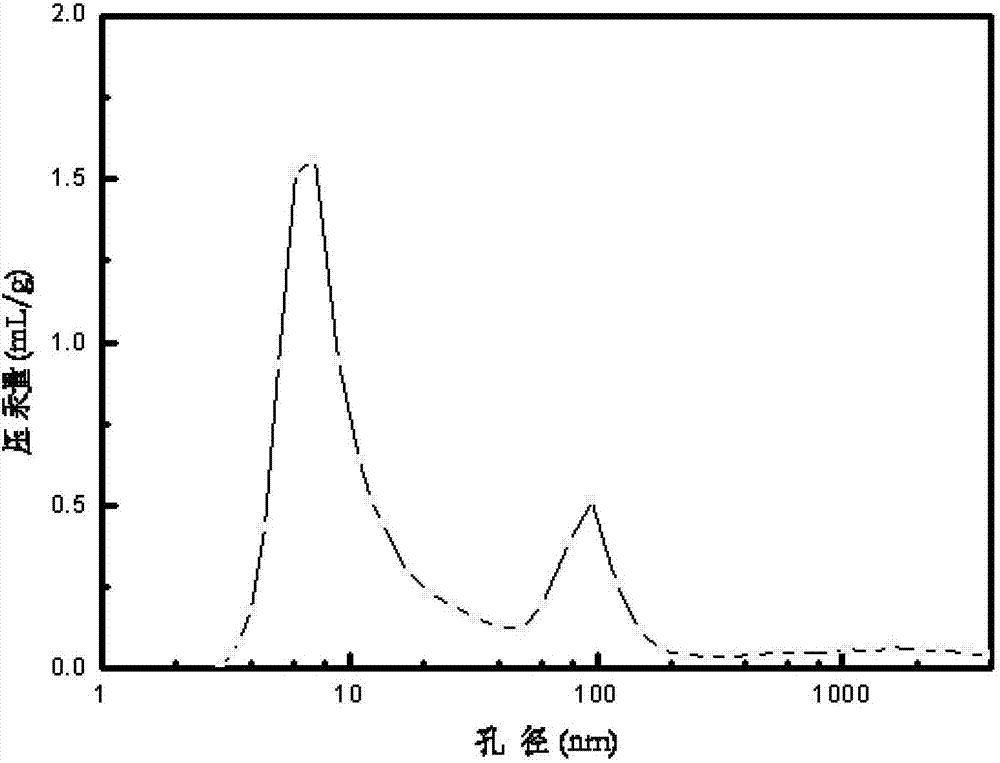Petroleum resin hydrogenation catalyst and preparation method thereof
A petroleum resin and catalyst technology, applied in the field of petroleum resin hydrogenation catalysts, can solve the problems of poor activity stability, low activity, poor impurity resistance, etc., to improve hydrogenation activity, improve resin hydrogenation activity, and reduce the proportion of micropores Effect
- Summary
- Abstract
- Description
- Claims
- Application Information
AI Technical Summary
Problems solved by technology
Method used
Image
Examples
Embodiment 1
[0031] First, 8.0 g of the water-soluble chitosan pore-enlarging agent was added to deionized water at 50° C., and then acetic acid was added dropwise until the chitosan was completely dissolved to obtain an acid solution containing the pore-enlarging agent. Weigh a certain amount of phosphoric acid and potassium nitrate respectively, completely dissolve the phosphoric acid and potassium nitrate in 70 g of distilled water to prepare an aqueous solution containing phosphorus and potassium. Weigh 350g of pseudo-boehmite powder and 20.0g of fenugreek powder into the kneader and mix evenly, then add the mixed solution of phosphoric acid and potassium nitrate, and finally add the chitosan-containing acid solution to the pseudo-boehmite The powder is evenly kneaded, and then kneaded-extruded into a clover shape. Dry at 120° C. for 8 hours, and calcined at 700° C. for 4 hours to obtain phosphorous and potassium-containing alumina carrier 1 . vector 1 P 2 o 5 0.5wt%, K 2 O 1.8 wt...
Embodiment 2
[0034] Add 8.0 g of the water-soluble chitosan pore-enlarging agent into deionized water at 50° C., and then add acetic acid dropwise until the chitosan is completely dissolved to obtain an acid solution containing the pore-enlarging agent. Weigh a certain amount of phosphoric acid and potassium nitrate respectively, completely dissolve the phosphoric acid and potassium nitrate in 70 g of distilled water to prepare an aqueous solution containing phosphorus and potassium. Weigh 350g of pseudo-boehmite powder and 20.0g of fennel powder into the kneader, mix well, then add the mixed solution of phosphoric acid and potassium nitrate, and finally add the acid solution containing chitosan to the pseudo-boehmite The stone powder is evenly kneaded, and then kneaded-extruded into a clover shape. Dry at 120° C. for 8 hours, and calcined at 700° C. for 4 hours to obtain an alumina carrier 2 containing phosphorus and potassium. carrier 2 P 2 o 5 0.8%, K 2 O 1.0%
[0035] Then use ph...
Embodiment 3
[0038] The preparation method of the carrier was carried out according to Example 1. The difference is that the water-soluble chitosan pore-enlarging agent is replaced by the non-water-soluble chitosan pore-enlarging agent, and the chitosan formic acid solution is stirred with a magnetic stirrer for 30 minutes to obtain the alumina carrier 3 with a macroporous structure. The content of auxiliary components phosphorus and potassium in the carrier accounts for the percentage of the carrier mass, respectively P 2 o 5 1.8wt%, K 2 O2.0 wt%. Its specific surface area and pore size distribution are shown in Table 1.
[0039] Add palladium chloride and nickel phosphide to 30ml of distilled water, add ammonia water to adjust the pH value to 3.0, then dilute with deionized water, make a solution and impregnate 100g of spherical alumina carrier with macroporous structure, the specific steps are the same as the implementation examples 1. The catalyst was dried at 120°C for 6h and th...
PUM
| Property | Measurement | Unit |
|---|---|---|
| pore size | aaaaa | aaaaa |
| specific surface area | aaaaa | aaaaa |
| pore size | aaaaa | aaaaa |
Abstract
Description
Claims
Application Information
 Login to View More
Login to View More - R&D
- Intellectual Property
- Life Sciences
- Materials
- Tech Scout
- Unparalleled Data Quality
- Higher Quality Content
- 60% Fewer Hallucinations
Browse by: Latest US Patents, China's latest patents, Technical Efficacy Thesaurus, Application Domain, Technology Topic, Popular Technical Reports.
© 2025 PatSnap. All rights reserved.Legal|Privacy policy|Modern Slavery Act Transparency Statement|Sitemap|About US| Contact US: help@patsnap.com



